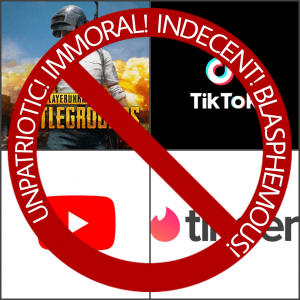Tick Tock, TikTok…

By Wajeeha Amir
In July 2020, while the world was engulfed in a pandemic that has killed millions, Pakistan was busy tackling something even worse: the vulgar content of the Chinese video-sharing social media application, TikTok. A final notice was issued to the app, to regulate its content in accordance with local norms and laws. A few months later, in October 2020, the Pakistan Telecommunication Authority (PTA, the enforcement agency for the country’s cybercrime laws), blocked the popular platform, citing the latter’s failure in the “proactive moderation of unlawful online content”.
Although the ban was rescinded rather quickly—ten days later—this incident opens up a portal for the exploration of Pakistan’s social media policy landscape.
PTA had the powers to block TikTok under the controversial Pakistan Electronic Crimes Act (PECA, 2016), section 37 of which gave it the discretion to block content “in the interest of the glory of Islam or the integrity, security or defence of Pakistan or any part thereof, public order, decency or morality…” PECA was (and is) considered by experts and activists to be a draconian law with wide discretionary powers that contradict the constitutionally guaranteed freedom of speech of Pakistani citizens. The ban on TikTok was an even bigger cause of alarm as it came around the same time as the ratification of the Removal and Blocking of Unlawful Content (Procedure, Oversight and Safeguards) Rules, 2020, under PECA. The delay, the lack of transparency throughout this process, and the content of these Rules—which further strengthened the arbitrary powers of PTA—seemed to confirm the establishment’s suspected intent to curb dissent in online spaces.
It is pertinent to note that TikTok had been cooperating with the Government of Pakistan over this issue, and even upgraded its local language content moderation capacity to comply with PTA’s demands. This cooperation must be contextualized in the tech climate of Pakistan, which has always been hostile to investors. Such arbitrary and ill-defined bans are a constant threat looming over potential investors, who tend to thrive in a stable and predictable legal environment. Apart from the overreaching content control, other laws also severely hinder the ease of business and operations for tech companies in the country. For instance, the local laws require any platform with over half a million users to establish a permanent database servers and office in the country within 18 months, which is an unfairly and unrealistically short period to do so.
On the other hand, such an arbitrary ban on a wildly popular platform (TikTok reportedly has above 20 million monthly users in the country) has not been well-received by citizens in general, and particularly content creators, who were still reeling from the YouTube ban (2012–2016) and severely affected the tech and creative landscapes of Pakistan. TikTok, furthermore, is also being hailed as a creative outlet where the masses—the poor strata of the country, presently hit by inflation and an economic recession—could share and enjoy content. It has been deemed as a space that has produced and witnessed many women content creators, as well as people from other minorities, at a time when physical and even online space has been shrinking rapidly for these groups.
Considering all this, it is not entirely clear why the government would want to ban such an app, rather than let it be an outlet for a nation frustrated by poverty and its miseries. On the one hand perhaps, it is natural for an authoritarian state to curb any platform that offers the chance of democratic dissent. Or perhaps, any forum that that is new and apparently beyond the direct control of the state is bound to instill fear. On the other hand, PTA cited many citizen complaints against TikTok and its “vulgar” content, on which it decided to take action. This also exposes a deep-seated classism in our people and our elites, who find it acceptable to perform senseless, viral challenges on their social media accounts, but cannot tolerate the poorer sections of society indulging in recreational activities of their choice. Either way, the prospects seem rather bleak for the future—social, economic, and technological—of Pakistan.



